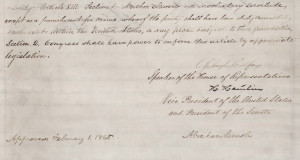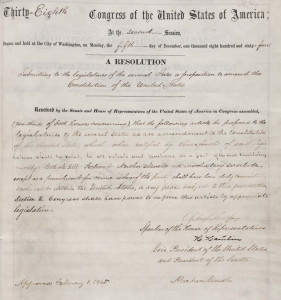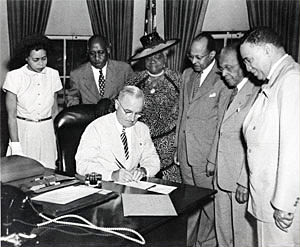“The great job is ended”: Today is National Freedom Day
Posted February 1st, 2015 by James DeWolf PerryCategory: History Tags: 13th Amendment, Abraham Lincoln, Emancipation, U.S. Congress
 Today, February 1, 2015, is the 150th anniversary of President Lincoln’s signing of the 13th Amendment to the Constitution, abolishing slavery throughout the United States.
Today, February 1, 2015, is the 150th anniversary of President Lincoln’s signing of the 13th Amendment to the Constitution, abolishing slavery throughout the United States.
Today is also National Freedom Day, the official U.S. observance of this momentous occasion.
The controversial adoption of the 13th Amendment
On the day before, January 31, 2015, the U.S. House of Representatives had finally passed Senate Joint Resolution 16, by the narrow margin of just two votes, proposing to the states a constitutional amendment to emancipate the nation’s slaves.
 The proposed amendment stated:
The proposed amendment stated:
Section 1.
Neither slavery nor involuntary servitude, except as a punishment for crime whereof the party shall have been duly convicted, shall exist within the United States, or any place subject to their jurisdiction.
Section 2.
Congress shall have power to enforce this article by appropriate legislation.
This amendment was highly controversial, having been rejected by the northern-controlled House seven months earlier. Emancipation represented a sea change in the meaning of the Civil War for the North, which had gone to war to preserve the Union and in which the cause of abolition had been highly unpopular until quite recently. ((The Emancipation Proclamation, while a dramatic position by President Lincoln in favor of making emancipation a Union war aim, was a wartime measure by the commander-in-chief, and was not sufficient to abolish slavery throughout the nation.))
Many in the Union still strongly opposed emancipation. Senator Lazarus W. Powell spoke not only for those in his home state of Kentucky, a border state, but also for many of his fellow Democrats when he argued during Senate debate on the amendment:
I do not believe it is the province of the Federal Government to say what is or what is not property. Its province is to guard, protect and secure, rather than to destroy.
Sen. Powell also pointed out that emancipation was not part of what the Union and its troops had been fighting, and dying, to achieve:
We were told by the Government in every form in which it could speak, at the beginning of this revolution, that whatever might be the result, the institution of the states would remain as they were.
This sentiment was widespread. Many northern representatives in Congress had voted to defeat the amendment in 1864, and even when it was adopted in 1865, supporters could barely muster enough votes to pass it. Even in northern New England, by that time as abolitionist as any region of the country was, there were congressional representatives from New Hampshire and Maine who voted against the Thirteenth Amendment or who pointedly abstained.
Lincoln signs the 13th Amendment
The following evening, at a public celebration at the White House, Lincoln proclaimed boldly:
The great job is ended.
However, Lincoln knew well that the “great job” of emancipation was far from finished: three-quarters of the states in the Union would have to ratify the proposed amendment in order for it to become law. Accordingly, Lincoln deployed his best political talents in order to make ratification seem necessary and inevitable.
As the first step in his campaign to win ratification, Lincoln took the unusual, and legally quite unnecessary, step of signing S.J.Res. 16, as if it were an ordinary piece of legislation which required the president’s signature.
Fittingly, on the same day, February 1, 1865, Lincoln’s adopted state of Illinois became the first state to ratify the future 13th Amendment.
National Freedom Day
 National Freedom Day, observed every year on February 1, commemorates Lincoln’s signing of what would become the Thirteenth Amendment.
National Freedom Day, observed every year on February 1, commemorates Lincoln’s signing of what would become the Thirteenth Amendment.
The movement to establish National Freedom Day was led by Major Richard R. Wright, a former slave who was just nine years old when Lincoln signed the document. Wright had gone on to become a successful banker and renowned educator, as well as a veteran of the Spanish-American War, and towards the end of his life, he desired to ensure that the nation remembered emancipation as well as the battles of the Civil War.
Accordingly, Wright led the first observance of National Freedom Day on February 1, 1942 at Independence Hall in Philadelphia. And in 1948, shortly after Wright’s death, President Truman signed Public Law 842, officially recognizing National Freedom Day as an annual federal observance.



Leave a Reply